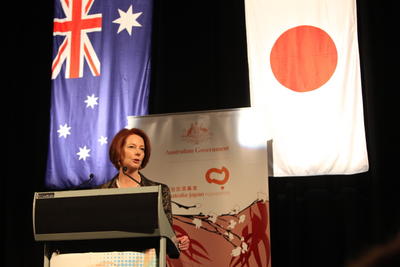So it may seem peculiar that these negotiations are still underway, when the first round took place in April 2007.
It is hard to imagine what the issues in finalising the agreement might be, given considerable convergence in each country’s ‘behind the border’ regulatory regimes over the last decade or more. There is of course the issue of agricultural market access into Japan, given the risk that negative impacts will be very localised. With general elections looming for both prime ministers, there may be a temptation to wait and see whether any new government might offer a better deal than the one currently on the table. In addition, both countries’ present governments sometimes seem less enamoured of free trade and economic rationalism than their main political opponents.
Delays in finalising the Australia–Japan FTA do not seem to be the direct result of the ‘Gillard Government Trade Policy Statement’, which proposed that Australia had the most to gain from multilateral trade and investment liberalisation (or even unilateral deregulation), and that more care had to be taken when assessing net economic benefits from FTAs. Nor do the Australia–Japan FTA negotiations seem to be lagging because Japan is still deciding whether to commit formally to joining Australia (and 10 other states) in negotiating the Trans-Pacific Partnership Agreement.
But one aspect of Australia’s 2011 Trade Policy Statement may be problematic. Australia has declared that it will not agree to any form of investor-state arbitration (ISA) provisions in future treaties, even with developing countries — thus breaking with practice dating back to 1988. Accordingly, foreign investors subject to illegal interference by a host state will have no recourse other than to encourage their home state to commence an inter-state arbitration. This is indeed the only avenue provided under the 2012 Australia–Malaysia FTA (although eschewal of ISA in that treaty is mitigated by provisions in the ASEAN–Australia–New Zealand FTA signed in 2009). Japan is on the record as having sought ISA protections in the FTA negotiations with Australia. Such a stance is consistent with Japan’s longstanding practice, even with developed country parties (such as the recent Japan–Switzerland agreement, which included ISA protections).
Admittedly, particularly in the wake of last year’s disasters, Japan’s energy-security needs generate pressure to secure an FTA with Australia regardless of its stance on ISA. But Japanese investors may now have greater awareness that the alternatives to inter-state arbitration — local court proceedings in Australia — may not always be optimal. Japan Tobacco recently failed in its claim before the High Court that Australia’s new plain packaging legislation amounted to an unconstitutional ‘acquisition’ of its property — Philip Morris Asia may well have more success in claiming ‘expropriation’ in violation of the 1993 Australia–Hong Kong investment treaty. Neither has Japan joined three other countries in bringing inter-state claims against Australia under the WTO Agreement on Trade-Related Aspects of International Property Rights (TRIPS). This is despite the fact that Japan Tobacco is a government-linked company, and therefore presumably better placed to encourage the Japanese government to initiate such a claim than smaller or purely private Japanese investors.
In exchange for having ISA excluded from the bilateral FTA with Japan, Australia will be expected to make some sort of concession to conclude the overall agreement. One distinct possibility is reduced market access for Australia’s agricultural exporters. Normally, such a group might raise concerns about this possibility with Australian government negotiators. It could object, for example, that Japanese investors may be deterred by the lack of ISA protections when considering investment in Australia compared to other countries, and that the subsequent failure to open domestic producers to Japanese competition will disproportionately favour inefficient industries.
However, it will be very difficult to quantify or even find out roughly how much Australia ends up paying at the expense of its agricultural producers to have ISA left out of the bilateral FTA. Of course, some parts of the Australian agricultural industry may well be concerned about inbound foreign investment, and therefore quite happy for ISA protections to be excluded. This may be why, so far, Australia’s peak agricultural industry groups have not joined with the Australian Chamber of Commerce and Industry or others in publicly urging the Gillard Government to revert to a more flexible stance on ISA in future treaty negotiations.
Yet ISA provisions can be drafted to balance the interests of both foreign investors and host states in various ways. For example, the scope for claiming ‘expropriation’ can be limited to more closely reflect the standard set by Australian constitutional law (similar to that in the Australia–Chile FTA, which entered into force in 2009). States could also add express provisions allowing them to suspend an investor’s arbitration claim if they agree that the host state’s impugned measures do not or should not amount to treaty violations.
By excluding any room to compromise on ISA, Australia may end up with sub-optimal bilateral FTAs, even in the context of Japan. In the longer term, it may also unravel the investment treaty framework that has emerged worldwide from the bottom up, including throughout Asia. Australia’s new policy position on this point risks significantly complicating and delaying both bilateral and regional FTA negotiations, as well as impeding chances of generating a comprehensive multilateral investment treaty that effectively balances both public and public interests.
Luke Nottage is a Professor and Associate Dean at the University of Sydney Law School, and founding co-director of the Australian Network for Japanese Law.
A longer and extensively hyperlinked version of this comment is available on his ‘Japanese Law and the Asia Pacific’ blog. Both draw on his joint research for the project ‘Fostering a Common Culture in Cross-Border Dispute Resolution: Australia, Japan and the Asia-Pacific’, supported by the Commonwealth through the Australia-Japan Foundation which is part of the Department of Foreign Affairs and Trade. The views expressed are his own, and do not represent Australian government policy.

